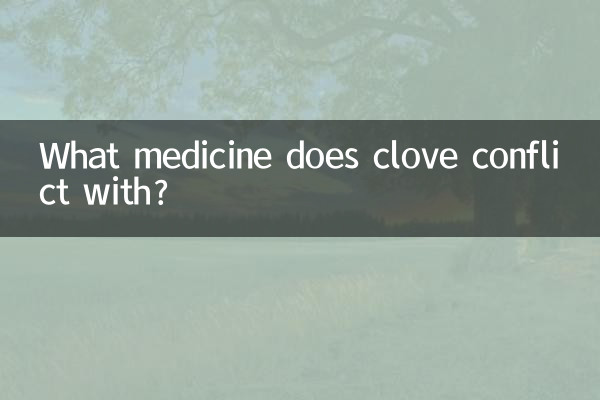What medicines are incompatible with cloves: Analysis of hot topics on the Internet and guide to medication contraindications
Recently, discussions about the incompatibility of traditional Chinese medicines have become a hot topic on the Internet, especially the topic of "what medicines are incompatible with cloves?" which has attracted widespread attention. This article will combine the popular data from the entire Internet in the past 10 days to sort out the interactions between cloves and other drugs, and provide structured analysis to help readers use drugs safely.
1. Basic properties and effects of cloves

Clove is the flower bud of clove, a plant in the Myrtaceae family. It is warm in nature and pungent in taste, and returns to the spleen, stomach, and kidney meridian. It has the effects of warming the middle and lowering the adverse reactions, dispersing cold and relieving pain. It is often used to treat cold stomach, vomiting, and epigastric and abdominal pain.
| Ingredients | function |
|---|---|
| Eugenol | Antibacterial, anti-inflammatory |
| Acetyl syringol | Analgesic, antioxidant |
| β-Caryophyllene | Promote digestion |
2. Summary of Cloves and Competing Drugs
According to traditional Chinese medicine theory and modern pharmacological research, cloves may have incompatibility or interactions with the following drugs:
| Drug/ingredient | Reasons for conflict | possible consequences |
|---|---|---|
| tulip | "Nineteen Fears" records that lilac fears tulips | The effect of the drug is offset or the toxicity is enhanced |
| Aspirin | Eugenol may increase anticoagulant effects | Increased risk of bleeding |
| antihypertensive drugs | Clove dilates blood vessels and synergistically lowers blood pressure | Risk of hypotension |
| Antacids | Cloves stimulate gastric acid secretion | Reduce antacid effect |
3. Recent hot topics of discussion
1.Traditional taboos on lilacs and tulips: Netizens are hotly discussing whether the "Nineteen Fears" theory of traditional Chinese medicine is scientific. Some studies believe that the combination of the two may inhibit the activity of liver drug enzymes.
2.Clove essential oil interacts with Western medicine: Social platforms have widely forwarded cases of potential risks between clove essential oil and drugs such as warfarin and ibuprofen.
| platform | Topic keywords | Number of discussions (times) |
|---|---|---|
| #What shouldn’t be eaten with cloves# | 128,000 | |
| Zhihu | "Taboos for compatibility with cloves" | 3400+ answers |
| Douyin | Popular science video on drugs that are incompatible with cloves | 5.6 million views+ |
4. Suggestions on safe medication use
1. When using Chinese patent medicines containing cloves (such as clove persimmon soup), you need to avoid taking them with turmeric preparations.
2. Those who have been taking Western medicines (especially anticoagulants and antihypertensive drugs) for a long time should consult a physician before using cloves.
3. When using clove essential oil externally, it is recommended to use it diluted to avoid contact with wounds.
Conclusion
Clove is a commonly used traditional Chinese medicine, and its incompatibility deserves attention. This article combines traditional theory with modern research to remind readers to pay attention to drug interactions and ensure drug safety. If combined medication is needed, it is recommended to be evaluated by a professional Chinese medicine practitioner or pharmacist.

check the details

check the details